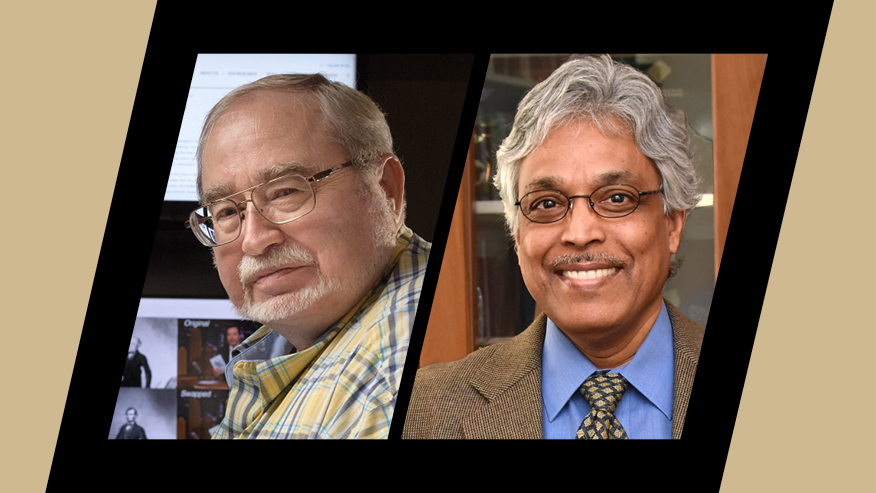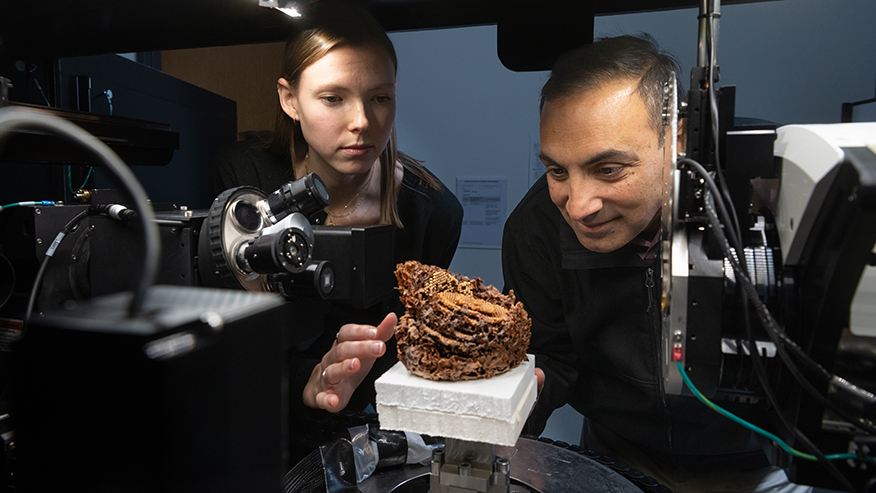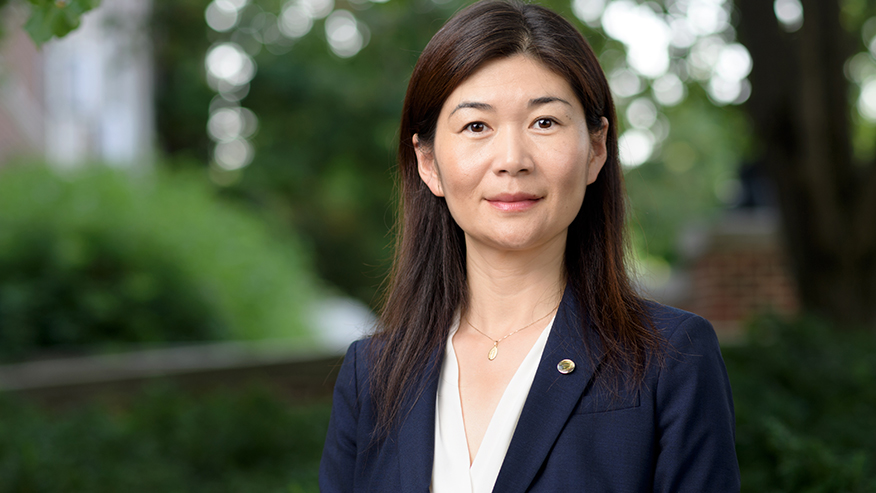Approaching artificial intelligence: How Purdue is leading the research and advancement of AI technologies

Purdue University is among the members of a new institute that will leverage artificial intelligence to help absorb and store carbon in the agriculture and forestry industries. (Photo provided by Shashi Shekar)
WEST LAFAYETTE, Ind. —
A technology with the potential to transform all aspects of everyday life is shaping the next pursuit at Purdue University. With the programs, research and expertise highlighted below, Purdue is guiding the advancement of artificial intelligence. If you have any questions about Purdue’s work in AI or would like to speak to a Purdue expert, contact Brian Huchel, bhuchel@purdue.edu.
President Mung Chiang’s 2023 Spring Commencement speech
- Taking AI as his theme, President Chiang concluded his address to graduates with these words: “Our best hope for AI is that it advances individual freedom. That it presents more options, not more homogeneity. That the freedom to choose and free will still prevail. Let us preserve the rights that survived other alarming headlines in centuries past. Let our students sharpen the ability to doubt, debate and dissent. Let a university, like Purdue, present the vista of intellectual conflicts and the toil of critical thinking.”
Purdue launches nation’s first Institute for Physical AI (IPAI)
- The Institute for Physical Artificial Intelligence, or IPAI, is a pillar of Purdue Computes, a new initiative consisting of three dimensions that enable the university to lead in a new frontier of technological advancement.
- The institute develops AI at the intersection of the virtual and the physical, leveraging strengths in agricultural data, neuromorphic computing, deep-fake detection, smart transportation data and AI-based manufacturing.
- This universitywide institute will add 50 affiliated faculty over the next five years and pursue cutting-edge topics through several current and emerging university research centers.
Purdue receives $500,000 grant as part of new AI Institute focusing on climate-smart agriculture and forestry
- Purdue has received a five-year, $500,000 grant for education and workforce development in the new AI Institute for Climate-Land Interactions, Mitigation, Adaptation, Tradeoffs and Economy (AI-CLIMATE).
- Part of a larger federal initiative for collaborative AI research, the institute will leverage AI to create more climate-smart practices that will absorb and store carbon while simultaneously boosting the economy in the agriculture and forests industries.
- Purdue will guide the development and deployment of instructional modules and other education related to digital agriculture and AI in climate-smart agriculture. Other institute members: University of Minnesota, Cornell University, Colorado State University, Delaware State University, North Carolina State University and the American Indian Higher Education Consortium.
Purdue announces computer sciences, AI, microchip initiative
- A recent Inside Indiana Business article highlights Purdue’s multimillion-dollar investment to advance AI, computer sciences and microchip research.
- President Mung Chiang said: “When it comes to computing, AI and chips, areas that will redefine the entire economy and society in every way imaginable, the strategic hiring, structuring and investment announced today enables Purdue University to advance at the forefront.”
- Purdue’s Institute for Physical AI will engage scientists across the university who bring “interdisciplinary thinking and problem-solving” to advance AI, according to Karen Plaut, executive vice president of research.
NSF funds institute to research AI-powered cybersecurity
- Six Purdue researchers have joined the nation’s best computer scientists and engineers to form the National Science Foundation-sponsored Institute for Agent-based Cyber Threat Intelligence and OperatioN (ACTION).
- ACTION researchers will work to bring the continuous learning – and now, reasoning – of AI to the constant situational awareness and actions that are fundamental to cybersecurity.
- Purdue will serve as one of ACTION’s major hubs for research, education, workforce development and technology transfer in this $20 million, five-year project.
Purdue expert: Is AI a danger or a tool?
AI presents both unique opportunities and unique challenges. How can we use this technology as a tool? Researcher Javier Gomez-Lavin, assistant professor in the Department of Philosophy, shares the work that needs to be done in habits, rules and regulations surrounding those who work with AI.
You’ve got to have heart: Computer scientist works to help AI comprehend human emotions
- Current AI technology understands only content, not context. Researcher Aniket Bera is programming devices to incorporate nonverbal cues and communication, which involve observing and analyzing facial expressions, body language, involuntary and subconscious movements and gestures, eye movements, speech patterns, intonations, and different linguistic and cultural parameters.
- This “emotional” AI can be used for mental health programs, navigating human emotions in shared spaces like self-driving cars, and providing rescue services during disasters.
- “The idea is to build a future where robots can be partners, can help humans accomplish goals and tasks more safely, more efficiently and more effectively,” Bera said. “In computer science, a lot of time the biggest problems are the humans. What our research does is put the human back into problem solving to build a better world.”
- Visit the Purdue News YouTube channel for video of demonstrations from Bera’s lab.
Purdue expert on building AI that understands human emotion
Hear researcher Aniket Bera explain more about his groundbreaking work to bring human behavior into AI and what sparked his interest in the technology. In this interview, Bera touches on the importance of technology in human emotion and the goal of his research lab.
Purdue University changing the view of artificial intelligence
- WRTV 6 Indianapolis visited Purdue’s West Lafayette campus to learn how the university is leading AI development at the intersection of technology and humanity.
- Researcher Aniket Bera showcased his robot dog and discussed his focus on incorporating human emotion into AI to ensure human factors are integrated into building technologies.
- The story also featured English professor Bradley Dilger on the AI software ChatGPT. His view: The technology isn’t taking away the ability to teach and learn but, rather, is evolving writing standards in the classroom.
Purdue expert on trustworthy AI
Is AI trustworthy? Hear Purdue University in Indianapolis researcher Arjan Durresi explain how making AI safe and easy to understand for the everyday user requires treating the development of the technology like the development of a child.
Purdue expert: Using AI for career development
AI is touching almost every subject, discipline and career field as it evolves. In human resources, the technology has already been used as a selection tool in job interviews. Professor Sang Eun Woo explains how we can turn this use of AI as a selection tool into a professional development tool.
Purdue expert: ChatGPT
How will AI influence writing and education? Harry Denny, professor of English and director of Purdue’s On-Campus Writing Lab, answers how ChatGPT and other AI programs may be integrated into the classroom experience.
Purdue expert on ChatGPT and cybersecurity
The rise of ChatGPT has created concerns over security. Professor Saurabh Bagchi shares the reality of cybersecurity concerns and how this technology could be used to strengthen the security of our computing systems.



